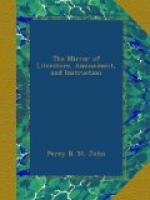Towards the autumn of 1803, Mr. Moore embarked for Bermuda, where he had obtained the appointment of Registrar to the Admiralty. This was a patent place, and of a description so unsuited to his temper of mind, that he fulfilled the duties of it by deputy, but the profits ultimately proved unworthy of Mr. Moore’s serious attention; and we believe Mr. Moore has suffered by the villany of this substitute, to an important amount. He likewise visited the United States, and upon his return home, in 1806, he published his remarks on the American character, in a work entitled “Epistles, Odes, and other Poems.” The preface to this little work sufficiently established the talent of Mr. Moore, as a prose writer. His opinion of the Americans is also there pretty freely expressed, and some of the poems, like those ascribed to Little, were objectionable in a moral point of view. The work was accordingly attacked with much severity, by Mr. Jeffrey, the editor of the Edinburgh Review: the irritated poet challenged his critic, but the duel was prevented, and the pistols being found loaded with paper pellets, the whole affair ended pleasantly enough.
The fate of Addison, with his Countess Dowager, holding out no encouragement for the ambitious love of Mr. Moore, he wisely and happily allowed his good taste to regulate his choice in a wife, and some years ago married Miss Dyke, a lady of great personal attractions, and accomplished manners, in whose congenial society he passes much of his time in the retirement of an elegant cottage, in Wiltshire, devoting himself chiefly to literary pursuits.
In 1808, Mr. Moore sent to the press “Corruption and Intolerance;” two poems, with notes: addressed to an Englishman, by an Irishman; and in 1809, “The Sceptic,” a philosophical satire. These works, of which the first is pungently satirical, are little known; but they are worthy of their author. They were succeeded in 1810, by “A Letter to the Roman Catholics of Dublin.” His next production, “Intercepted Letters, or the Two-penny Post Bag, by Thomas Brown, the younger,” 1812, was eagerly perused, and fourteen editions of it were printed. Its severities on an elevated personage and the court, will perhaps never be forgotten by the parties. In sparkling wit, keen sarcasm, and humorous pleasantry, it is rivalled only by another volume, entitled “The Fudge Family in Paris,” published in 1818, the hero of which is a distinguished poet, and a zealous supporter of the present administration. To this class of Mr. Moore’s works belong his “Fables for the Holy Alliance,” and “Rhymes on the Road,” which deserve, in some respect, a higher reputation than the former volumes.
Mr. Moore appears equally to have cultivated a taste for music as well as for poesy; and the late Dr. Burney was perfectly astonished at his talent which he emphatically called “peculiarly his own.” In 1813, Mr. Moore’s fame was materially increased by the appearance of his exquisite songs to Sir John Stevenson’s selection of Irish Melodies. Some of these songs are among the finest specimens of poetry in our language, and the morality of the whole of them is unexceptionable. They have since been collected into one volume. In 1816, he published “A Series of Sacred Songs, Duets, and Trios,” the music to which was composed and selected by himself and Sir John Stevenson.




